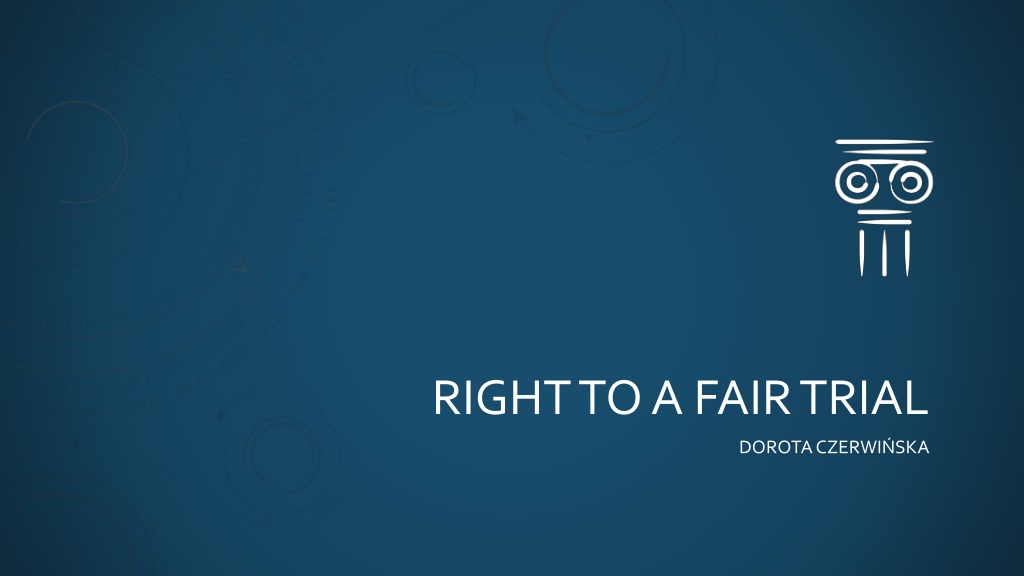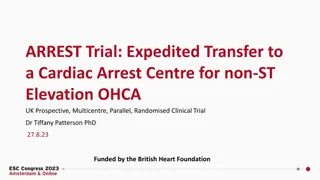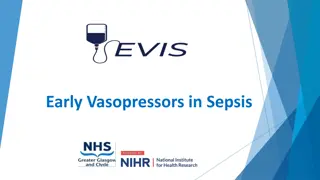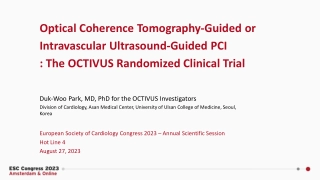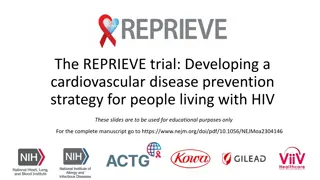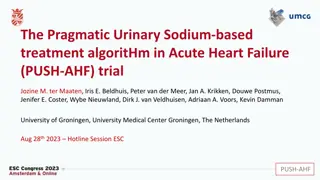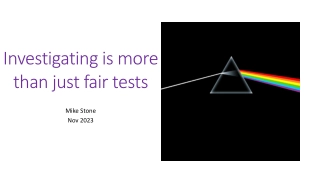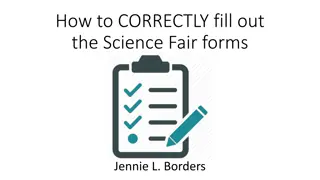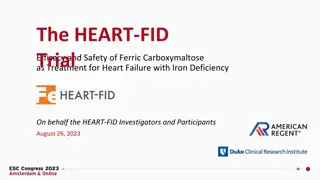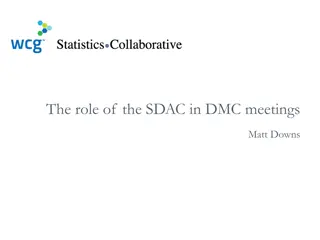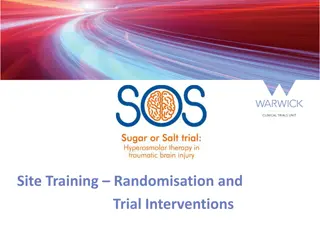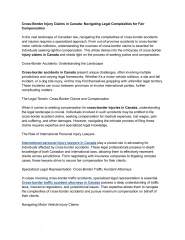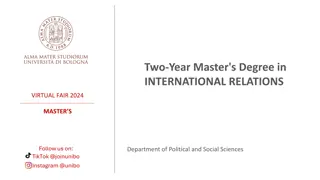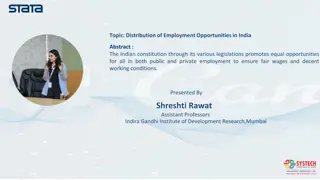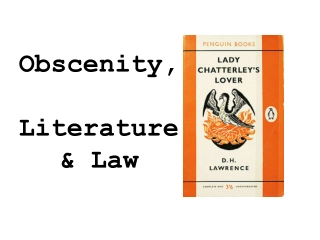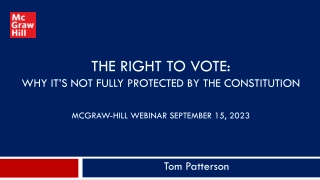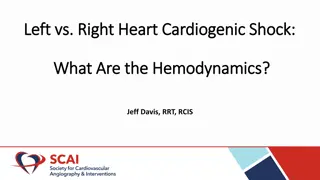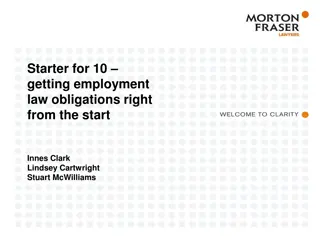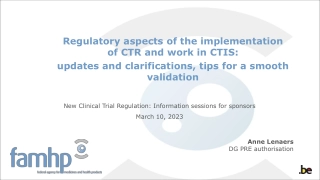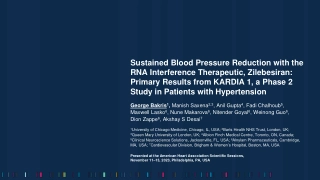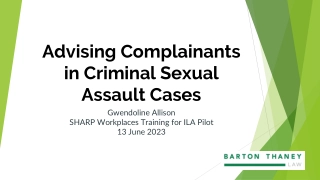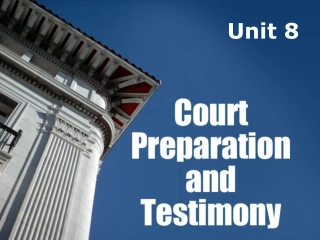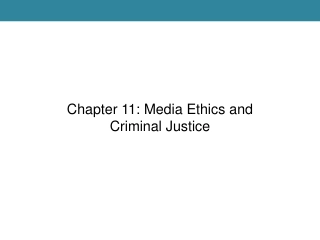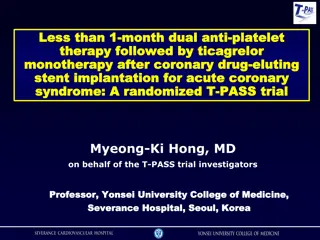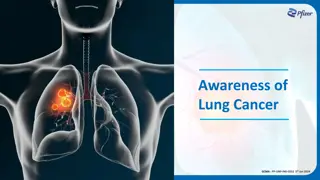RIGHT TO A FAIR TRIAL
The right to a fair trial is fundamental, encompassing aspects such as public hearings, independent tribunals, legal assistance, and the presumption of innocence. Legal frameworks, including the ECHR, the EU Charter of Fundamental Rights, and the U.S. Constitution, provide essential protections to uphold this right.
RIGHT TO A FAIR TRIAL
PowerPoint presentation about 'RIGHT TO A FAIR TRIAL'. This presentation describes the topic on The right to a fair trial is fundamental, encompassing aspects such as public hearings, independent tribunals, legal assistance, and the presumption of innocence. Legal frameworks, including the ECHR, the EU Charter of Fundamental Rights, and the U.S. Constitution, provide essential protections to uphold this right.. Download this presentation absolutely free.
Presentation Transcript
RIGHT TO A FAIR TRIAL DOROTA CZERWI SKA
LEGALSOURCESARTICLE6 ECHR 1. In the determination of his civil rights and obligations or of any criminal charge against him, everyone is entitled to a fair and public hearing within a reasonable time by an independent and impartial tribunal established by law. Judgment shall be pronounced publicly but the press and public may be excluded from all or part of the trial in the interests of morals, public order or national security in a democratic society, where the interests of juveniles or the protection of the private life of the parties so require, or to the extent strictly necessary in the opinion of the court in special circumstances where publicity would prejudice the interests of justice. 3. Everyone charged with a criminaloffence has the following minimum rights: a. to be informed promptly, in a language which he understands and in detail, of the nature and cause of the accusation against him; b. to have adequate time and facilities for the preparation of his defence; c. to defend himself in person or through legal assistance of his own choosing or, if he has not sufficient means to pay for legal assistance, to be given it free when the interests of justice so require; d. to examine or have examined witnesses against him and to obtain the attendance and examination of witnesses on his behalf under the same conditions as witnesses against him; 2. Everyone charged with a criminal offence shall be presumed innocent until proved guilty according to law. e. to have the free assistance of an interpreter if he cannot understand or speak the language used in court.
LEGALSOURCESARTICLE47 EU CHARTER OF FUNDAMENTALRIGHTS Everyone whose rights and freedoms guaranteed by the law of the Union are violated has the right to an effective remedy before a tribunal in compliance with the conditions laid down in thisArticle. Everyone is entitled to a fair and public hearing within a reasonable time by an independent and impartial tribunal previously established by law. Everyone shall have the possibility of beingadvised, defendedand represented. Legal aid shall be made available to those who lack sufficient resources in so far as such aid is necessary to ensure effective access to justice.
LEGALSOURCESFIFTHAMENDMENTTO THE U.S. CONSTITUTION(REINFORCEDIN 14TH AMENDMENT) No person shall be held to answer for a capital, or otherwise infamous crime, unless on a presentment or indictment of a Grand Jury, except in cases arising in the land or naval forces, or in the Militia, when in actual service in time of War or public danger; nor shall any person be subject for the same offence to be twice put in jeopardy of life or limb; nor shall be compelled in any criminal case to be a witness against himself, nor be deprived of life, liberty, or property, without due process of law; nor shall private property be taken for public use, without just compensation.
LEGALSOURCESARTICLE45 OF THE POLISH CONSTITUTION 1. Everyone shall have the right to a fair and public hearing of his case, without undue delay, before a competent, impartial and independent court. 2. Exceptions to the public nature of hearings may be made for reasons of morality, State security, public order or protection of the private life of a party, or other important private interest.Judgments shall beannounced publicly.
LEGALSOURCESFRANCE TheConstitution of 1958 regulates French Declaration of Human and Civic Rights of 26 August 1789 (still binding) Case law oftheConseilConstitutionnel
LEGALSOURCESVARIOUSPROVISIONSOF THE GERMAN CONSTITUTION Article 103 (1) In the courts every person shall be entitled to a hearing in accordance with law. Article 99 (1) Judges shall be independent and subject only to the law. Article 101 (1) sent. 3 No one may be removed from the jurisdiction ofhis lawful judge
LEGALSOURCESARTICLE111 OF THE ITALIAN CONSTITUTION Jurisdiction is implemented through due process regulated by law. have always voluntarily avoided undergoing cross- examination by the defendantor thedefence counsel. All court trials are conducted with adversary proceedings and the parties are entitled to equal conditions before an impartial judge in third party position. The law provides forthe reasonable durationoftrials. The law regulates the cases in which the formation of evidence does not occur in an adversary proceeding with the consent of the defendant or owing to reasons of ascertained objective impossibility or proven illicit conduct. In criminal law trials, the law provides that the alleged offender shall be promptly informed confidentially of the nature and reasons for the charges that are brought and shall have adequate time and conditions to prepare a defence. The defendant shall have the right to cross- examine or to have cross-examined before a judge the persons making accusations and to summon and examine persons for the defence in the same conditions as the prosecution, as well as the right to produce all other evidence in favour of thedefence. The defendant is entitled to the assistance of an interpreter in the case that he or she does not speak or understand the language inwhichthe courtproceedings are conducted. All judicial decisions shall include astatement ofreasons. Appeals to the Courtof Cassation in cases of violationsof the law are always allowed against sentences and against measures affecting pronounced by ordinary and special courts. This rule can only be waived in cases of sentences by military tribunals in timeof war. personal freedom Appeals to the Court of Cassation against decisions of the Council of State and the Court of Accounts are permitted only forreasons ofjurisdiction. In criminal law proceedings, the formation of evidence is based on the principle of adversary hearings. The guilt of the defendant cannot be established on the basis of statements by persons who, out of their own free choice,
FAIR TRIAL It isa concept, an elaborate constructionof dynamically evolving contents rather than a single right Theoretically itisnot considered the aim of procedure but a method of conductingit, a legalstandard
ECtHRSROLE IN CREATING THE CONCTENTS OF THE RIGHT TO A FAIR TRIAL The biggest responsible for the modern understanding of the rightto a fair trial is the EuropeanCourt of Human Rights, which throughtits case-law puta lot of contents in this conceptthat are not literally mentioned in the convention However, the attitude is s0metimes criticised (also by legal scholars) from two differentpositions: as presenting too much judicial activism as being incoherentin given rulings
The further parts of presentation are based on the ECtHRs guide to Article 6 in Criminal cases and involves quotations from therein: Guide on Article 6 - Right to a fair trial (criminal limb) (coe.int) OVERALL FAIRNESS OF THE CRIMINAL PROCEEDINGS The most importantfeature of ECtHR s attitute towardsthe standard of fair trial crucialfor understandingthe reasonsof certainsituationsnot being treated as Article6 s violations: what constitutes a fair trial cannot be the subject of a single unvarying rule but must depend onthe circumstances oftheparticularcase the Court s task is to evaluate the overall fairness of the criminal proceedings. Compliance with the requirements of a fair trial must be examined in each case having regard to the development of the proceedings as a whole, and not on the basis of an isolated consideration of one particular aspect or one particular incident. However, it cannot be excluded that a specific factor may be so decisive as to enable the fairness of the trial to be assessed at an earlierstageintheproceedings the cumulative effect of various procedural defects may lead to a violation of Article 6 even if each defect, taken alone, would not have convinced the Court that the proceedings were unfair
SCOPE OF APLLICATION in the determination of any criminal charge autonomous meaning: substantive rather than formal notion of the charge whether the case regards a criminal act Engel criteria (Engel and others v. Netherlands): National classification Nature of the offence (generally binding, purpose of deterrence or punishment, public interest usually protected by criminal law involved, comparative aspects) Severity of the possible penalty Whole criminal proceedings (=investigation as well) covered until the final determination of whether the charge is confirmed; does not normally apply to enforcement proceedings as well as to reopening of proceedings
OVERALL FAIRNESS OF THE CRIMINAL PROCEEDINGS The most important feature of ECtHR s attitute towards the standard of fair trial crucial for understanding the reasons of certain situations not being treated as Article 6 s violations: what constitutes a fair trial cannot be the subject of a single unvarying rule but must depend onthe circumstances oftheparticularcase the Court s task is to evaluate the overall fairness of the criminal proceedings. Compliance with the requirements of a fair trial must be examined in each case having regard to the development of the proceedings as a whole, and not on the basis of an isolated consideration of one particular aspect or one particular incident. However, it cannot be excluded that a specific factor may be so decisive as to enable the fairness of the trial to be assessed at an earlierstageintheproceedings the cumulative effect of various procedural defects may lead to a violation of Article 6 even if each defect, taken alone, would not have convinced the Court that the proceedings were unfair
CRUCIAL COMPONENTS Right of access to a court Fairness of procedure Reasonable time Presumption of innocence Rights of defence Public hearing Institutional requirements: tribunal established by law independent impartial Effective participation Equalityof arms Reasoned judgment Freedomfrom self- incrimination Immediacy Legal certainty Publicity Orality Right to be presentat trial And its consequence: the burden of prood Right to information Preparation of the defence Right to defend oneselfin person or throughlegal assistance Examination of witnesses Interpretation (separate lecture with dr Czerniak) (separate lecture with me)
FAIRNESS RIGHT TO EFFECTIVE PARTICIPATION IN THE PROCEEDINGS the right of an accused to participate effectively in a criminal trial includes: right to be present right to hear and follow right to compile notes right to have particular needs of vulnerable defendants taken into account participation through videoconference does not, as such, violate this right
FAIRNESS EQUALITY OF ARMS AND ADVERSARIAL PROCEEDINGS UNDER 6 (1) equality of arms each party be given a reasonable opportunity to present their case while not being disadvantaged against their oponent (with regard to any aspect whatsoever: questioning witnesses, calling experts, access to the documents, being present at certain hearings) adversarial hearing parties have knowledge and may comment on all the evidence or motions of the other party: disclosure of evidence! But not as an absolute right. It is possible to withhold certain materials, but only if its strictly necessary for good reasons, under additional scrutiny and with compensation measures
FAIRNESS RIGHT TO A REASONED JUDGMENT judgments of courts and tribunals should adequately state the reasons on which they are based, which serves the purpose of demonstrating to the parties that they have been heard, thereby contributing to a more willing acceptance of the decision on their part. In addition, they oblige judges to base their reasoning on objective arguments, and also preserve the rights of the defence. National courts should indicate with sufficient clarity the grounds on which they base their decision. The reasoned decision is important so as to allow anapplicant to usefullyexercise any available right ofappeal it is not enough to provide any statement of reasons, it has to be sufficiently precise however, the ECtHR approves unreasoned jury decisions, as long as the decision is understandable
FAIRNESS RIGHT TO REMAIN SILENT AND NOT TO INCRIMATE ONESELF this is one of the most important sECtHR s input in the concept of the right to a fair trial as it is nowhere expressly mentioned in the Convention (in contrast to American constitution) anyoneaccusedofacriminal offencehas therightto remain silentandnottocontributeto incriminatinghimself it is the generally recognised international standards which lie at the heart of the notion of afairprocedure underArticle6; by providing the accused with protection against improper compulsion we contribute to avoiding miscarriagesofjustice andtosecuring theaims ofArticle 6
FAIRNESS RIGHT TO REMAIN SILENT AND NOT TO INCRIMATE ONESELF It refers to evidence obtained by coercion or oppresion in defiance of the defendant s will: Obligation to testify under threat of sanctions Physical or psychological pressure applied in order to obtain real evidence or statement the use of subterfuge to elicit information that the authorities were unable to obtainduring questioning It covers not only directly incriminating testimonies It does not cover material which exists independently of the defendant s will Right of access to a lawyer is an important factor but these are separate rights and waiver of one does not necessarily entail a waiver of the other
FAIRNESS RIGHT TO REMAIN SILENT AND NOT TO INCRIMATE ONESELF in assessment of whether the right not to incriminate onself was violated the Court takes into account: the nature and degreeof compulsion; the existence of any relevant safeguards inthe procedure; the use to which any material so obtained isput What s interesting is that the ECtHR refuses to state that it is inadmissible to draw any adverse effects from the defendant s silence (in contrast to EU Law)
FAIRNESS ADMISSIBILITY OF EVIDENCE admissibility of evidence as such, which is primarily a matter for regulation under national law It is not, therefore, the role of the Court to determine, as a matter of principle, whether particular types ofevidence forexample,evidence obtainedunlawfullyinterms ofdomestic law may be admissible. The question which must be answered is whether the proceedings as a whole, includingthe wayinwhichtheevidence wasobtained,were fair factors: the nature of the allegedunlawfulness whether the applicant was given an opportunity to challenge the authenticity of the evidence and to oppose itsuse the quality of the evidence the circumstances in which it was obtained and whether these circumstances cast doubt on its reliability or accuracy whether the evidence in question was or was not decisive for the outcome of the criminal proceedings WhileArticle 6guaranteesthe righttoafairhearing,itdoesnotlaydownanyrules onthe
FAIRNESS ADMISSIBILITY OF EVIDENCE HOWEVER if the evidence was obtained in breach of Article 3, its use always raises serious issues as to the fairness of the proceedings, even if the admission of such evidence was not decisive in securing a conviction. Thus using statements obtained in such a way always makes renders the proceedings as a whole unfair (also if the torture or inhuman or degrading treatment were used by a private party wik v. Poland) The position of the ECtHR is more complicated with regard to real evidence: Real evidence obtained through torture proceedings always unfair Real evidence obtained through inhuman treatment it will only breach Article 6 if it has been shown that the breach of Article 3 had a bearing on the outcome of the proceedings against the defendant, that is,had an impacton hisor her convictionor sentence
FAIRNESS ENTRAPMENT In a number of judgments, of which the most important is Ramanauskas v. Lithuania, the ECtHR underlined the unfairness of conviction for criminal activity that was incited by state undercover agents. The agents may gather the evidence of ongoing criminal activity of an individual also be becoming a party to illicit activity; however, they may not be an active party who lures the individual into crimes that would not otherwise be committed; the state agents have to me remain essentially passive
FAIRNESS THE PRINCIPLE OF IMMEDIACY It refers to the possibility of the accused to be confronted with the witness in the presenceofthe very samejudgewho ultimately decidesthe case normally a change in the composition of the trial court after the hearing of an important witness should lead to the rehearing of that witness but, once again, this is not an absolute prohibition
FAIRNESS THE PRINCIPLE OF LEGAL CERTAINTY It requires domestic authorities to respect the binding nature of a final judicial decision It is connected with two issued: The ne bis in idem rule The ability of the individual to foresee legal consequences of their actions which may be influenced by divergent case law of national authorities
FAIRNESS PREJUDICIAL PUBLICITY The ECtHR has found that a virulent press campaign can adversely affect the fairness of a trial by influencing public opinion and, consequently, the jurors called uponto decide the guilt ofanaccused However, press coverage of current events is an exercise of freedom of expression Thus, the Court takes into account: the time elapsed between the press campaign and the commencement of the trial, and in particularthedeterminationofthe trialcourt s composition; whetherthe impugnedpublicationswere attributable to,orinformedby, the authorities; whether the publications influenced the judges or the jury and thus prejudiced the outcome ofthe proceedings
FAIRNESS PLEA BARGAINING As you already know from classes, plea bargaining as such is not contrary to the Convention, as long as conditions of effective waiver of the right to a fair trial are fulfilled
Neither the letter nor the spirit of Article 6 of the Convention prevents a person from waiving of his own free will, either expressly or tacitly, the entitlement to the guarantees of a fair trial Pfeifer and Plankl v. Austria However, the waiver has to be: unequivocal attended by a minimum safeguards not contrary to any public interest the consequences must be foreseeable to the defendant
FAIRNESS PUBLIC HEARING public scrutiny is an important safeguard of fair trial public hearing is necessary an oral one unless no aspects of the case require it right to a public hearing involves the right to be present at trial
FAIRNESS REASONABLE LENGTH OF PROCEEDINGS Starting point: charging day Ending point: the final determination of guilt (including appeal) The assesment on the basis of individual circumstances of the case, taking into account overall length Criteria: The complexity of a case The applicant s conduct The conduct of the relevant s authorities States have to introduce an effective remedy in Poland: special complaint about the length of proceedings (amended after Rutkowski v. Polska judgment issue not solved, systemic problem with the speed of proceedings)
